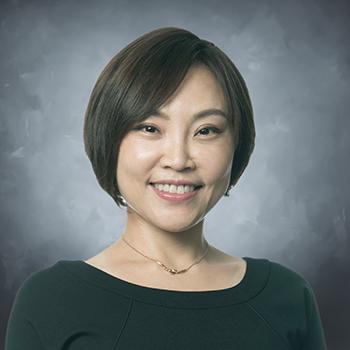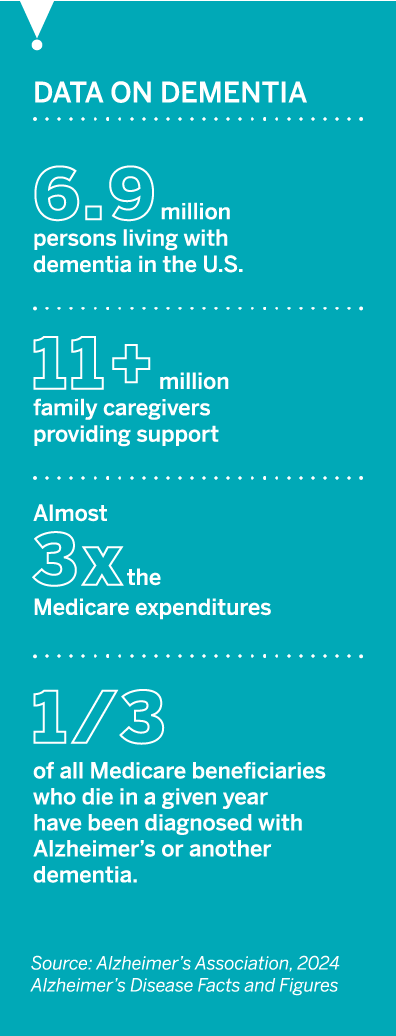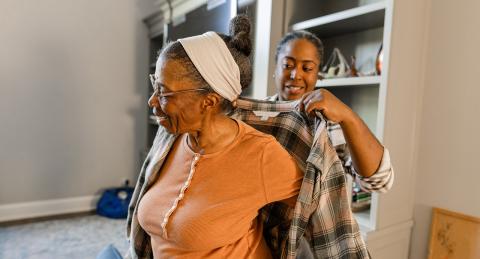
More than 55 million people have dementia worldwide with nearly 10 million new cases every year, according to the World Health Organization. Dementia is currently the seventh leading cause of death and one of the major causes of disability and dependency among the elderly globally.
School of Nursing Associate Professor Jung Kwak, PhD, MSW, FGSA, wants to help persons living with dementia (PLWD) and their caregivers during hospital transitions.

“Dementia patients are frequently hospitalized, and when they go home, their family caregivers are unprepared, feel overwhelmed and burnout with taking care of the patient at home,” Kwak said. “Our intervention targets those who are at high risk of readmission and their family caregivers.”
Dementia is a term used for several diseases that affect memory, thinking and the ability to perform daily activities. The illness gets worse over time and mainly affects older people but not all people will get it as they age. Dementia is a syndrome that can be caused by several diseases that, over time, destroy nerve cells and damage the brain, typically leading to deterioration in cognitive function beyond what might be expected from the usual consequences of biological aging. While consciousness is not affected, the impairment in cognitive function is commonly accompanied, and occasionally preceded, by changes in mood, emotional control, behavior or motivation.
Kwak has always loved working with and being around older adults, as it was part of her cultural and family upbringing. Her family was deeply affected when both of her maternal grandparents and her paternal grandmother were diagnosed with dementia.
“For my paternal grandfather, as well as my maternal grandmother, my mother was the main caregiver,” Kwak said. “She had a full-time job, and while my father was a dedicated son and was involved, it really came down to my mom to make a lot of practical and complex health care decisions. She was also more involved with the drug caregiving than anyone else in the family. And I think seeing my mother provide care to my grandparents helped me to appreciate how much love and sacrifice is involved in providing care for persons living with dementia.”
When her mother was a caregiver, there wasn’t much awareness of dementia, let alone supportive services for caregivers. Kwak would observe and admire her mom for the way she cared for her grandparents. As one of the important role models in her life, she said watching her mother care for them made her realize how important it is to provide and develop better support systems not only for those living with dementia but also for the family caregivers.

This experience with her family was what made Kwak interested in dementia caregiving.
“I am a gerontologist, and my research has always focused on dementia patients and their family caregivers, especially as the disease progresses into a more advanced stage,” Kwak said. “Dementia is becoming a very important health condition and issue that affects millions of people.”
Kwak said hospitalization for persons living with dementia should be avoided as much as possible. During the care transition process, oftentimes, there is a significant gap in terms of information needs, education and coaching for patients, as well as family caregivers.
“We do know that care transition is a really important part of the health care experience,” she added. “But many transition programs have not been designed with the input of dementia patients, family caregivers and stakeholders. My project aims to fill that gap by designing an intervention that is meaningful and helpful to the patients and family caregivers and can be implemented and sustainable in a complex health care system.”
Kwak’s primary research project is to co-design, implement and test a hospital-based community health worker-led care transition support for PLWDs and care partners with stakeholders, including PLWDs, caregivers and health care system partners at Dell Seton Medical Center, Ascension Seton Medical Center and community partners.
To conduct her research, Kwak received a variety of funding, totaling nearly $300,000, from the Cain Collaborative Research Pilot Grant, St. David’s CHPR Pilot Study Grant and The National Institutes on Aging IMPACT Collaboratory for the Health Care Systems Scholars Award. She also received a philanthropic gift to the School of Nursing from Sheri Clark Henriksen, BS ‘84, TOWER Fellow ‘23.
“I chose to support dementia and dementia caregiver research at the School of Nursing because my father is now suffering from dementia,” Henriksen said. “Contributing to Dr. Kwak’s work is important to me because her study is so important to the caregivers in our communities. Her study can identify the challenges in our system and aid the caregivers, who need to be informed on the best options to help their newly diagnosed family members. Taking care of a family member with dementia can be one of the most challenging times in a family’s life. Both the caregiver and the patient need the most relevant resources a community can offer.”
Two years ago, Kwak’s work “Culture, Faith and Trust in Dementia Surrogate Decision-Making,” funded by The Sojourns Scholar Leadership Program, was the building block for her current project, which provided a needs assessment with hospitalized dementia patients and their family caregivers.
This research is a collaborative effort with Sarah Mills, MD, and Mike Brode, MD, from Dell Medical School; Elizabeth Kvale, MD, from Baylor College of Medicine; and Snehal Patel, MD from Central Health, formerly at Dell Medical School.
Together, they are testing and developing the hospital-based community health worker-led care transition support from the bottom up, manually creating the intervention process training materials, as well as administering a pilot test at one of the health care system partner sites.

The project goal is to implement and test a hospital-based community health worker-led care transition support for PLWDs and care partners. Community health workers are trusted allies of the community. They can effectively bridge cultural gaps between vulnerable patients, family caregivers and the health care system to address their needs holistically. They can provide simple, straightforward advice, information and individualized support for family caregivers, fostering their self-efficacy and resilience. Essentially, they are patient advocates, connectors, navigators and coaches.
The intervention is delivered by a community health worker who will educate, coach family caregivers and provide care navigation support, starting from the time patients are hospitalized and continuing the support after they are discharged from the hospital.
Overall, they want to improve the quality of life for both the persons living with dementia and their family caregivers and design the process to integrate into the health care system, so it can be adopted, implemented and sustained in various settings. The long-term goal of this research is to design a safe and effective transition support that is acceptable for various stakeholders.
“It is such a privilege to listen to, work with and learn from the patients and the families,” she added. “It is also a privilege to work with clinicians and care staff including social workers, case managers and health care system vendors at these two hospitals.
“We need to develop innovative cost-effective services and programs to address the complexities of these patients and families coming from very diverse backgrounds. I feel honored to be part of that effort.”